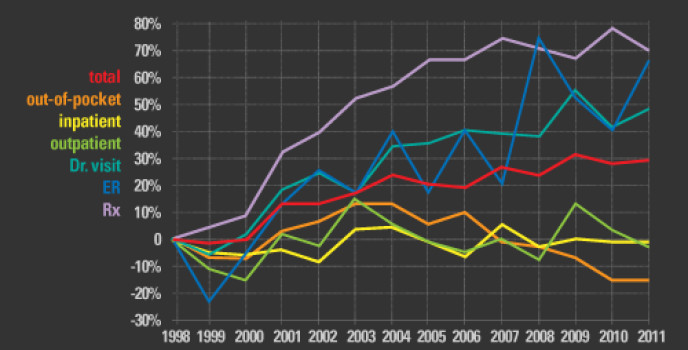
A new study finds that smokers and the obese ring up substantially higher annual health care costs than their nonsmoking, non-obese peers. The added costs are highest among women, non-Hispanic whites and older adults, the study reports.
“Health care costs associated with obesity and smoking are substantial, about $1,360 and $1,046 per person per year, respectively,” said University of Illinois kinesiology and community health professor Ruopeng An, who conducted the analysis. These numbers reflect the added costs of obesity and smoking above the average annual health care expenditures of non-obese and nonsmoking Americans, he said.
The findings appear in the journal Public Health.
Out-of-pocket medical expenses, inpatient and outpatient care, emergency room visits and prescription drugs all contribute to the added health care expenditures, with inpatient prescriptions contributing the most, An said.
“The added costs were not only large but also increased substantially over the last decade,” he said. Health care costs associated with obesity increased by a quarter and those linked to smoking rose by nearly a third from 1998 to 2011, he said.
“The increase is mainly driven by the increase in expenses on prescription drugs,” An said. “Pharmaceutical expenses associated with obesity and smoking were 62 percent and 70 percent higher (respectively) in 2011 than in 1998.”
To get these numbers, An analyzed individual data from 125,955 participants in the 1996-2010 National Health Interview Surveys (NHIS) who also participated in the 1998-2011 Medical Expenditure Panel Surveys (MEPS). The NHIS is the nation’s largest annual cross-sectional in-person household health survey, An said.
“Data on individual characteristics … in the NHIS 1996-2010 waves were linked to their corresponding annual health care expenditures (reported in) the MEPS 1998-2011 waves by personal identifier and survey year,” An wrote.
For obesity, the added medical expenses were highest among those with the highest body mass index, An reported. And, as expected, older adults with longer smoking histories had “substantially higher medical costs (than) their younger counterparts,” he wrote.
The new study analyzed only health care-associated expenses, not costs to employers and to society that result from absenteeism or reductions in productivity.
“Cost estimates of this study only pertain to short-term health consequences of obesity and smoking,” An wrote.
“Annual per-capita expenses associated with obesity are found to exceed those associated with smoking in nearly all forms of care except for emergency-room services,” he wrote. “However, unlike smoking, which substantially increases the likelihood of premature death (for example, mortality from lung cancer), obesity and associated Type 2 diabetes primarily lead to long-term disability, so that from a lifetime perspective, obesity could tax the health care system even more than smoking.”
Story Source:
The above story is based on materials provided by University of Illinois at Urbana-Champaign. The original article was written by Diana Yates. Note: Materials may be edited for content and length.
Journal Reference:
- R. An. Health care expenses in relation to obesity and smoking among U.S. adults by gender, race/ethnicity, and age group: 1998–2011. Public Health, 2014; DOI: 10.1016/j.puhe.2014.11.003
